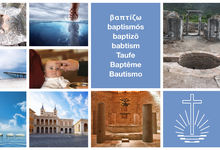The sacraments (59): For the departed under the hands of the Apostles
Can the departed receive salvation too? The question is as old as Christianity itself. The answer of the New Apostolic Church is not even all that new—and nevertheless, it is unusual. Here is the story of how the sacraments for the departed came to be dispensed.

“1870. The first sealing for the departed (the child of brother v. d. Bosch) after consultation and study of Holy Scripture. The second was the child of Brother Meijnders.”—Did this New Apostolic tradition really begin that long ago?
Various recollections
In actual fact, historians trace the beginnings of this tradition to the year 1872. This date is based on recollections from Chief Apostle Hermann Niehaus, which he expressed in divine services for the departed in 1927 and 1928. But it has less to do with the first holy acts themselves than with the reflections of Friedrich Wilhelm Schwarz—the leading Apostle of the time—on the subject.
The specific references to the year 1870 are found in a commemorative document—in honour of Apostle Schwarz—from the Verkruisen household. And this is certainly a name with some history. After all, Nicolaas Verkruisen senior was front and centre when things really began to get moving in the Amsterdam congregation. His participation in the earlier dispensation of sacraments to the departed is documented.
So does this mean the history needs to be rewritten? Not necessarily—because the dates given by Chief Apostle Niehaus and Shepherd Verkruisen diverge in more than this instance. And reliable sources that could set the record straight are nowhere to be found at present.
Reports in newsletters
What is certain, however, is that by 1874 at the latest, Holy Sealing for the departed was practically a matter of course in the congregations of the Netherlands. This is clear from a publication known as De Herinnering, a regularly appearing newsletter with reports on divine services and news from the congregations.
Again and again this publication would also incorporate reports on the sealing of the departed: “Many departed souls were baptised with fire and the Spirit,” it says in April 1874, for example. And in May of that same year, the following record appears: “On Ascension Day, four Christians were sealed, and then many from among the departed.”
Already in January of that year, Apostle Schwarz explained his understanding of the beyond and the sacraments. This included the following remarks: “Those who wish to be baptised on behalf of the departed must therefore make a high priority of their belief in the baptism of water and of fire. But anyone who still has doubts and does not stand firm in this faith should—and must—not do so on behalf of the departed.”
The beginning of the story
Irrespective of the year, however, the sources do tend to agree on a common picture: it was largely personal strokes of fate, particularly the deaths of unbaptised children, that raised the question of salvation for the departed in very concrete and personal terms.
The answer came in two ways. On the one hand, there were visions in which some members of the congregation were able to see departed souls come to place their heads under the hands of the Apostle during sealing services. On the other hand, there was also evidence recorded in Holy Scripture: the Apostles occupied themselves intensively with the vicarious baptism referenced in 1 Corinthians 15: 29, for example.
After Apostle Schwarz, it was not long before Apostle Friedrich Wilhelm Menkhoff and the later Chief Apostle Friedrich Krebs also performed sealings for the departed. But that was just the beginning of a turbulent history which will be the subject of the next issue in this series.
Photo: Christian - stock.adobe.com
Article info
Author:
Date:
Keywords:
Andreas Rother
21.07.2022
sacraments,
Holy Sealing,
divine services for ministers















